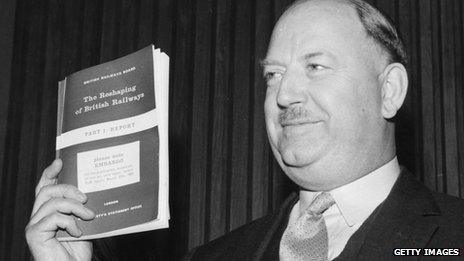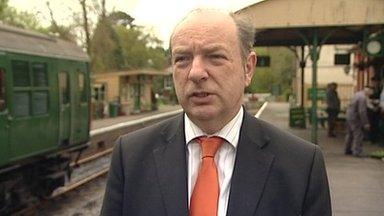Beeching: Railway vandal or visionary?
- Published
- comments

Ministers were desperate to stem losses on the railway when they asked Dr Richard Beeching to compile his report
His name is a dirty word among railway enthusiasts, but was he actually ahead of his time? A night of programmes on BBC Parliament explores the legacy of Dr Richard Beeching.
When Dr Beeching was brought in by ministers in the early 1960s, Britain's railways were making annual losses of £140m - £2.5bn at today's prices.
His report, published in March 1963, recommended closing about a third of the network which was least cost-effective - amounting to 5,000 miles of track and 2,363 stations.
Scores of branch lines closed during the rest of the 1960s and afterwards.
Interviewed for a night of programmes to commemorate the report's 50th anniversary on the BBC Parliament channel, Lib Dem Transport Minister Norman Baker echoes the conventional view of Dr Beeching's report.
"I think Dr Beeching was a vandal who destroyed much of our heritage," said the Lewes MP.
"Of course some lines were uneconomic and had to be closed at the time. But he's taken it out a whole lot of lines which we now wish hadn't been taken out."

Norman Baker said rail was becoming more popular
He added that the coalition was trying to reverse some of the effects of what became known as the "Beeching Axe".
Mr Baker said: "We are on an upward trajectory with passenger numbers. We now have got more people on the railway than at any time since 1927, with a network about half the size.
"Many of our lines are now at capacity and all the way through the recession we've seen passenger numbers grow, whereas on the roads it's flatlining and there isn't an increase in road traffic.
"So the railways are now becoming a choice for some people, not a second choice but a first choice. That's a societal change. We have to recognise that. We are dealing with the problems of success on the railway, rather than failure."
More than 3,000 miles of railway disappeared in the 1950s, before the report was published, as the government desperately tried to balance the books, but this did not succeed in making the system sufficiently economic.
Justified?
So Dr Beeching, a former ICI boss, was drafted in to look at the figures and work out a plan.
After his report was published he became a hate figure among supporters of rail travel.
But he also recommended improvements to Britain's busiest lines and is credited as being the brain behind the development of fast intercity routes.
Retired civil servant Sandy Morrison, who assessed lines in southern England for Dr Beeching, said: "We were dealing with the figures as they were in 1963. Sorry, that's all we could deal with. We were not predicting the future.
"I would agree with the core contention that history has shown some of the closures were unjustified."
But, asked if he thought Dr Beeching had been successful in taking the railways in a better direction, he replied: "I think he was, on the whole."
Dr Beeching was himself a user of the railways, commuting from his home in East Grinstead, in West Sussex, to London.
John Padgham, who joined British Railways in 1957, used to see him as he caught his morning train.
"Part of my duty, during the night, was to clean his engine," he said. "But we only used to clean one side of it, the side he got in on, actually, to make sure he saw a clean engine.
"I don't know if he took any notice or not, because he was an accountant. He wasn't an engine man, was he?"
East Grinstead was not one of the stations closed in the years following the Beeching Report.
Beeching Night, presented by Nicholas Owen, begins on the BBC Parliament channel at 19:00 on Sunday 9 June.
- Published27 March 2013
- Published25 March 2013